“Oh my god, they are going to blame overweight people for their own deaths.” This was my first thought in the winter or spring of 2020 when I initially heard about the risk factors leading to death by COVID. The list included obesity, diabetes, old age, compromised immune systems, and being Black.
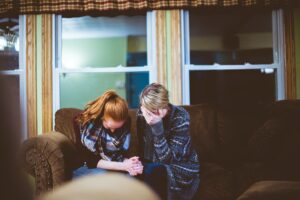
Photo by Ben White on Unsplash
My mind revisited those first weeks of the pandemic as I saw an interview with Ed Yong of The Atlantic on the PBS News Hour. For two years, he has been talking to COVID grievers. You can read his most recent article, “The Final Pandemic Betrayal,” here or watch the seven-minute PBS interview here.
I wrote blogs about the grief rituals after the death of my mother-in-law during COVID and public displays of remembrance of those who died. Now Ed Yong has written and talked in the most moving fashion about the more than 9 million fellow Americans who have lost a close relative to the virus.
COVID Grievers Face an Unprecedented Time to Grieve

Photo by Claudia Wolff on Unsplash
We who have NOT lost someone to COVID have little concept of the unique, profound, and enduring grief now being visited upon these grievers. Here is the story of a mother who watched her son die on her phone:
“Teresita Horne had spent more than a week on a breathing machine when her 13-year-old son, Donovan, died in a different hospital; she watched him die on her phone. ‘I remember screaming,’ she told me. ‘When your kids are sick, they need you, but I couldn’t be there to comfort him. I couldn’t hold his hand one last time.’”
Don’t ask, “Were they vaccinated?”
Then there was the tone in our questions to those who lost a loved one to COVID. “Did they get the vaccine?” What does that have to do with our attempt to reach out to someone caught up in grief? The mere question implies that there was something the dead person should have done or, worse yet, the griever should have done to prevent the death. Aside from appeasing our curiosity about if they got the vaccine, how does that question comfort the bereaved?

Photo by Pierre Bamin on Unsplash
Again, Yong writes, “Many grievers end up blaming themselves. Should I have pulled them out of that nursing home? Should I have pushed them harder to get vaccinated? And worst of all: Did I give them COVID?“
He concludes: “In her book, The Myth of Closure, Pauline Boss, a therapist and pioneer in the study of ambiguous loss, offers some advice for pandemic grievers: ‘It is not closure you need but certainty that your loved one is gone, that they understood why you could not be there to comfort them, that they loved you and forgave you in their last moments of life,’ she wrote. Instead of waiting for a clean but mythical endpoint to one’s loss, it is better to search for ‘meaning and purpose in our lives after this horrific time in history,’” she said.
Do yourself a favor. Read Yong’s article or listen to the short interview. I was moved by the stories of these COVID grievers
________________________________________
Chaplain Hank Dunn is the author of Hard Choices for Loving People: CPR, Feeding Tubes, Palliative Care, Comfort Measures and the Patient with a Serious Illness and Light in the Shadows. Together they have sold over 4 million copies. You can purchase his books at hankdunn.com or on Amazon.
________________________________________
Cover Photo by Shane on Unsplash

 I lived a few doors down from Scott and his family for four years. His sisters babysat my kids. I was Scott’s den leader in Cub Scouts. As disease ravaged his young body, Scott graduated from college in a wheelchair. I was so privileged to be a part of his care.
I lived a few doors down from Scott and his family for four years. His sisters babysat my kids. I was Scott’s den leader in Cub Scouts. As disease ravaged his young body, Scott graduated from college in a wheelchair. I was so privileged to be a part of his care.
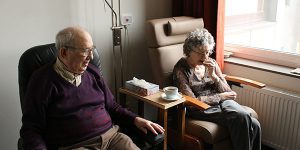 Several years ago, I spoke at the Centra Hospital in Lynchburg, Virginia. There were about 50 people in the room, including members of the clergy, physicians, nurses, social workers, and just plain folks. I divided my presentation, the first half devoted to helping patients and families make end-of-life decisions, and the second half to the emotional and spiritual issues at the end of life.
Several years ago, I spoke at the Centra Hospital in Lynchburg, Virginia. There were about 50 people in the room, including members of the clergy, physicians, nurses, social workers, and just plain folks. I divided my presentation, the first half devoted to helping patients and families make end-of-life decisions, and the second half to the emotional and spiritual issues at the end of life. About six months after the patient died, the lady visited her friend. The now-widow said, “I made a mistake. I made the wrong decision. I should have left the tube out and let him die sooner.”
About six months after the patient died, the lady visited her friend. The now-widow said, “I made a mistake. I made the wrong decision. I should have left the tube out and let him die sooner.” I’ve had the opportunity to officiate many funerals over the years. This was supposed to be one of the “easy” ones. The dead man’s family had a relative who once was a member of my church in Vienna, Virginia, back in the day. None of the family attended that church now — or any church. So, when the man died suddenly of a heart attack at 64, they turned to us for a minister to conduct the service — kind of a rent-a-preacher.
I’ve had the opportunity to officiate many funerals over the years. This was supposed to be one of the “easy” ones. The dead man’s family had a relative who once was a member of my church in Vienna, Virginia, back in the day. None of the family attended that church now — or any church. So, when the man died suddenly of a heart attack at 64, they turned to us for a minister to conduct the service — kind of a rent-a-preacher.
 Recently,
Recently, 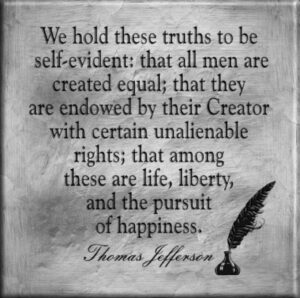 Then, of course, “happy” is
Then, of course, “happy” is 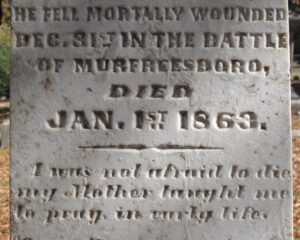 Recently, I
Recently, I 

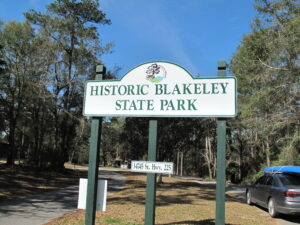 FORT BLAKELEY, ALA. March 1, 2022: What if your teenage son went off to war — fought in one battle — died in that battle — and then you find out his death was actually after the war had ended — AND your side lost the war? Today, we would say parents of these dead soldiers would have complicated grief. Indeed.
FORT BLAKELEY, ALA. March 1, 2022: What if your teenage son went off to war — fought in one battle — died in that battle — and then you find out his death was actually after the war had ended — AND your side lost the war? Today, we would say parents of these dead soldiers would have complicated grief. Indeed.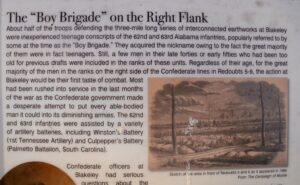
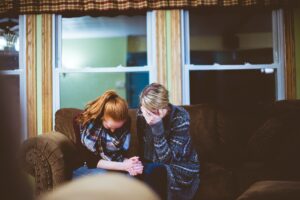
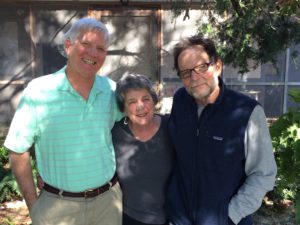
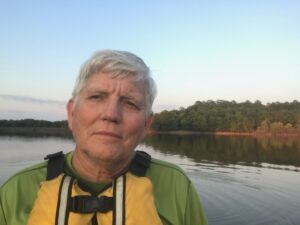
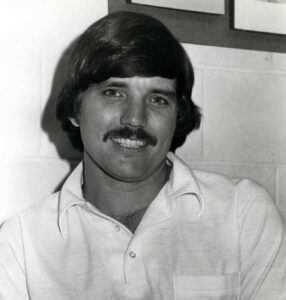

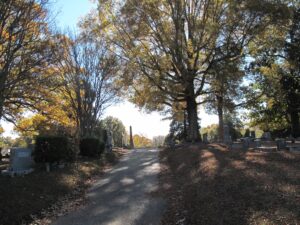 A young soldier named William Gaston Barringer turned 18 on October 5, 1862. Less than three months later, he was wounded and died as a prisoner of war 200 miles from home. Yet, there is evidence he had a good death. How could this be?
A young soldier named William Gaston Barringer turned 18 on October 5, 1862. Less than three months later, he was wounded and died as a prisoner of war 200 miles from home. Yet, there is evidence he had a good death. How could this be? Plagues in the 1300s killed 40-60% of the European population. Such widespread death led to the release of a couple of books known as the Ars moriendi (“The Art of Dying”). These were Christian instructions on how to have a good death. There were accompanying woodcuts, like one showing demons tempting the dying man with crowns symbolizing earthly pride.
Plagues in the 1300s killed 40-60% of the European population. Such widespread death led to the release of a couple of books known as the Ars moriendi (“The Art of Dying”). These were Christian instructions on how to have a good death. There were accompanying woodcuts, like one showing demons tempting the dying man with crowns symbolizing earthly pride.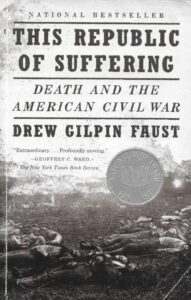 Was conscious
Was conscious “I know he would never want to be kept alive like this,” she said to me over the sound of a machine forcing air into her husband’s lungs. He lay motionless, eyes closed. He had been like this for months after arriving at the nursing home from the hospital.
“I know he would never want to be kept alive like this,” she said to me over the sound of a machine forcing air into her husband’s lungs. He lay motionless, eyes closed. He had been like this for months after arriving at the nursing home from the hospital.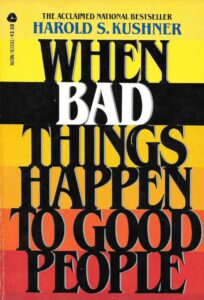 Since she was Jewish and asked this question, I gave her a copy of Rabbi Harold Kushner’s
Since she was Jewish and asked this question, I gave her a copy of Rabbi Harold Kushner’s 

